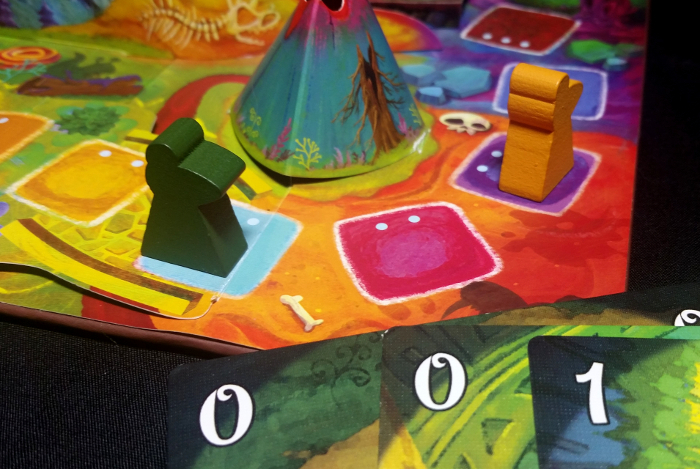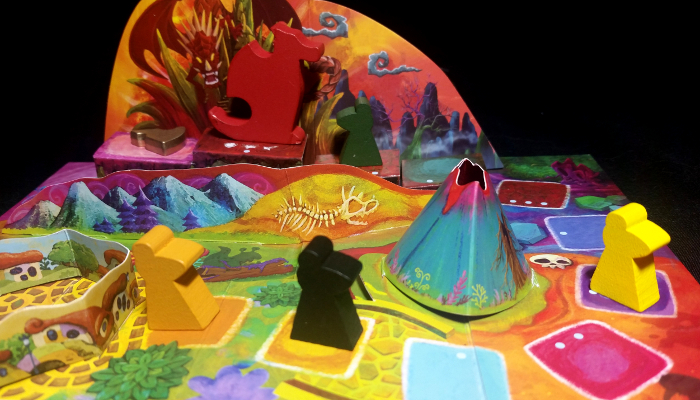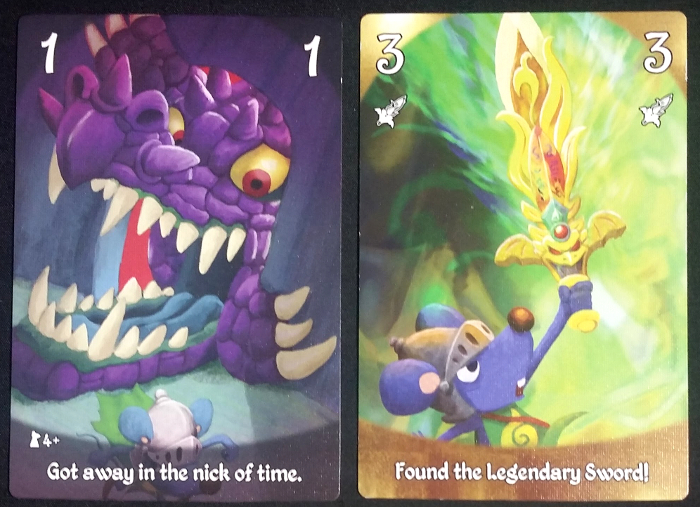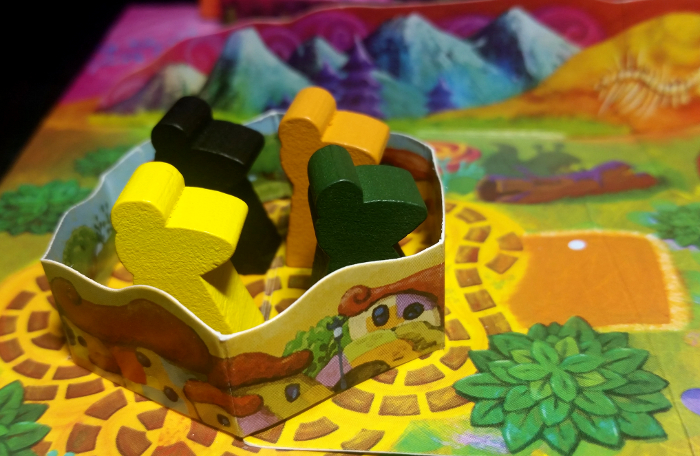Editor’s Note: Mythe is the first Rundown Review, a new subset of reviews that allows us to provide an Archetype breakdown on games when a normal comprehensive review isn’t possible or necessary. You can read more here for details.
The Overview
The normally quiet mouse kingdom of Mythe has been attacked by an evil dragon who has stolen their Sacred Cheese. As one of several brave heroes, players compete in a journey to the dragon’s lair to see who will be the one to defeat the dragon, recover the Cheese, and become the savior of the kingdom. This is done in a series of turns over the game’s 20 minute playthrough, primarily utilizing a Press Your Luck card mechanic.
Players start with a small hand of cards varying in value from 0-3 points. On their turn, the player chooses a random card from another player’s hand, which is played to the table. If a card with a number on it is drawn, they may choose to either select another card in an attempt for a higher point total, or stop.
If they stop, the player then moves along the board as far as they can, with each empty space needing from 1-3 points to enter. However, if an Obstacle card is drawn instead, then the player loses all their points and can’t move. In either case, the player adds the cards to their hand. Finally, they may then distribute any number of cards from their to other players.
The first player to successfully move into the dragon’s space defeats it and claims their delicious quarry.
The Rundown
 Architects: Games of adventure and journeying can appeal to Architects so long as there’s a tangible sense of progression. However, due to its simple premise, there’s little of that in Mythe for them to gravitate towards. Each mouse is otherwise identical in nature, and the cards you have are constantly changing. There’s also no way to completely protect a card you may want to keep, such as one of three needed to defeat the dragon, which they won’t like. As a result, aside from trying to hoard cards, which in turn only makes you a bigger target for pilfering, there is nothing here for them to build upon.
Architects: Games of adventure and journeying can appeal to Architects so long as there’s a tangible sense of progression. However, due to its simple premise, there’s little of that in Mythe for them to gravitate towards. Each mouse is otherwise identical in nature, and the cards you have are constantly changing. There’s also no way to completely protect a card you may want to keep, such as one of three needed to defeat the dragon, which they won’t like. As a result, aside from trying to hoard cards, which in turn only makes you a bigger target for pilfering, there is nothing here for them to build upon.

Tacticians: Mythe offers some simple tactical thinking by way of bluffing and trying to stack the odds in your favor, such as by keeping Obstacles and doling out cards to dissuade others from taking them from you, but the super short play window and the chaotic nature of the game severely limits your options. In truth, with Mythe your turn consists of a single decision point – whether to continue to press your luck or not. This makes it practically impossible to plan beyond that single action, let alone from turn to turn, and therefore is the exact opposite of what this group enjoys in a game.

Socializers: One of the best aspects of Mythe is its accessibility. This game is engaging, easy to learn, and plays quickly. The nature of taking cards from another person’s hand ensures that you to feel involved even when it isn’t your turn, and the images depicted on the cards have a knack for holding your attention – which is especially helpful when playing with families or younger players. Additionally, the element of the unknown as to whether someone will succeed or bust is dished out at just the right increment in this game to feel enticing but not punishing. You can certainly expect this group to be on board with Mythe’s cheesy adventure, though the more players you have at the table the better. While Mythe can play as few as two, it’s ideal with 4-5.

Daredevils: Although more forgiving of the game’s unpredictable nature than other Archetypes, it’s surprising to say that this group will also have trouble staying invested in Mythe after a half dozen playthroughs or so. They’ll certainly enjoy that a favorable outcome each turn is anything but guaranteed, and they’ll also particularly like that a certain amount of risk taking is required to win, especially as players get closer to the dragon. However, while there’s room for minor psychological tactics to deter people from taking your cards, the game isn’t deep enough to allow for much in the way of strategies – unconventional or otherwise. As such, once the allure of Mythe’s press your luck nature wears off due to the repetition of each playthrough, their waning interest will have them seeking new adventures.

Immersionists: Mythe’s biggest asset is its visual appeal, including a playful pop-up board, colorful pieces, and a superfluous but amusing metal Cheese token that literally adds heft to the victory prize. Above all is the game’s striking card art. While the numbers on its jumbo-sized cards are the only mechanically relevant part, the focus of each card depicts various moments of the mice on their adventure. Whether showing successes or setbacks, Mythe’s artwork is both well drawn and reinforces the game’s theme. This group will also enjoy that the card captions of revealed cards create minor (if out of order) bits of storytelling of their mouse’s adventure each turn. That all said, while Immersionists will appreciate the visual aptitude the game offers, especially for one so short, most of said theme is only surface-level. Because of this, the game likely won’t hold their interest beyond a few playthroughs.

Strikers: Between the press your luck style nature of the game and largely random nature of which cards you pull from your opponents, Mythe is simply too unpredictable for this group’s liking. So much of what happens in the game is dependent solely on those draws, and this will ultimately prove frustrating to most goal-oriented players since it removes the feeling that you have much agency over your own chances at victory.
The Takeaway
At its delicious cheese-laden core, Mythe is a lighthearted and lightweight filler game. This game is neither long or complicated, nor is it intended to be, as its focus is more on the experience than deep decision-making. The game’s card imagery and pop-up board components draws you in with an impressive eye-catching presentation, especially given its rodent-sized footprint. It then keeps you there with its simple rules and fast turns. That simplicity cuts both ways, however, as even with its random nature the game can start to feel rather rote after a while. Nonetheless, Mythe makes for a decent pint-sized journey that’s particularly accessible to audiences who may be short on time or attention spans.
Mythe is a product of LudiCreations and Passport Game Studios.
Cardboard Republic Snapshot Scoring (Based on scale of 5):
Artwork: 4.5
Rules Clarity: 4.5
Replay Value: 3
Physical Quality: 4
Overall Score: 3.5




